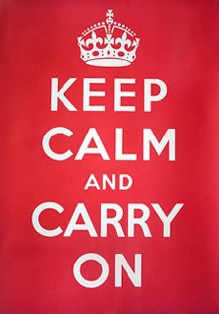Managing Pandemic Anxiety on LBI
The Coronavirus (COVID-19) is a pandemic. It is present, powerful and persistent. It’s also on beautiful Long Beach Island. Stress, fear, and anxiety are the scary triplets of these times of uncertainty.
Today, let’s consider what this fear-reality looks like to our brains; how it makes our bodies feel; and the way it affects our emotions and temperaments. I’ll also offer some practical tools to cope with this rising and pervasive epidemic.
 First, what is fear? What does it look like? What does it feel like? Unlike fruit on a tree, fear is not visible. Fear is more like a threat, an internal force that feels as though something dangerous is happening or about to happen. Our bodies rev up incessantly as our hearts thump in our ears, our chests or both. Our limbs feel weak and maybe we’re a bit dizzy or weepy. “Is this a heart attack or a panic attack?” we ask ourselves. Our inhalations and exhalations are shallower. There’s a lump in our throats.
First, what is fear? What does it look like? What does it feel like? Unlike fruit on a tree, fear is not visible. Fear is more like a threat, an internal force that feels as though something dangerous is happening or about to happen. Our bodies rev up incessantly as our hearts thump in our ears, our chests or both. Our limbs feel weak and maybe we’re a bit dizzy or weepy. “Is this a heart attack or a panic attack?” we ask ourselves. Our inhalations and exhalations are shallower. There’s a lump in our throats.
Second, what does fear cause us to do? Sometimes, we might lash out at small provocations. We often project ahead that we might lose our jobs, our 401K’s, our homes, our businesses, our lives and our minds! But, understand that fear is, in warranted circumstances, necessary. It is the “fight or flight” emotional response, a primal unconscious reaction to an immediate and alarming situation. We feel compelled to respond and react. Why?
We react because there’s an internal pressure deep within a part of our brain (the temporal lobe) where the “amygdala” resides. This amygdala sends out a signal for the “fight or flight” stress response. Thanks to neuroscientists, we now have a wealth of data about the amygdala’s powerful sensitivity and its formidable capacity for storing old trauma. For example, PTSD from soldiers’ Military experiences and other people’s horrific and traumatic life circumstances are stored there in the amygdala. So, these stored traumatic memories can be instantly aroused by frightening stimuli in a present-day circumstance (think the COVID19).
Third, what is our response? Sometimes people respond by becoming hyper-vigilant. They worry – nonstop - in a real or an imagined fearful situation, particularly, if it seems even vaguely (unconsciously) familiar to a previous circumstance. Others respond in the opposite direction: they diminish or deny that there even is a crisis. Some people or cultures respond the way they witnessed their own parents or cultures react during dire and frightening circumstances. But, take heart, these observations alone - when we recognize them - can slow down the grip of fear or at least console the individual that his or her response is real.
Fourth, what can we do to manage our fear? We can be pro-active, courageous and stay calm. I know this  sounds easy to do in the abstract but be assured of the benefits of these behaviors because clinical studies show how calm people really do make better decisions. So, during this pandemic, reduce your TV viewing if you find yourself become more and more anxious. Modify your internet browsing, and obsessive phone checking if you find yourself unable to sleep or function. Plus – and I strongly recommend doing this - draw on facts about what people did in previous periods of history to survive plagues and wars, diseases, deaths, and natural disasters. Emulate these people where their actions were helpful and inspiring. Meditate more, pray more, walk more; they are known combat-reducing stressors.
sounds easy to do in the abstract but be assured of the benefits of these behaviors because clinical studies show how calm people really do make better decisions. So, during this pandemic, reduce your TV viewing if you find yourself become more and more anxious. Modify your internet browsing, and obsessive phone checking if you find yourself unable to sleep or function. Plus – and I strongly recommend doing this - draw on facts about what people did in previous periods of history to survive plagues and wars, diseases, deaths, and natural disasters. Emulate these people where their actions were helpful and inspiring. Meditate more, pray more, walk more; they are known combat-reducing stressors.
As I mentioned earlier, you now know that Long Beach Island has confirmed the arrival of COVID-19. LBI also carries its own memory of times of undeniable hardship. One has only to remember Hurricane Sandy in 2012 and the devastation this monster storm inflicted. But, oh, how this wonderful island community pulled together to support its friends, neighbors, vacationers, and businesses. Well, LBI is being called upon to do it again. Here are a few concrete tools for a solid start:
Step One: Follow the directives set forth in last week’s edition by Deputy Mayor, John Imperiale, Commissioner of Public Safety and Public Affairs, Harvey Cedars, N.J. His positive attitude of being proactive will benefit everyone. Ideas as safe social distancing, vigilant and frequent hand washing, covering one’s mouth when sneezing, yawning, coughing, nose-blowing. No handshaking or hugging for now. I would add be hopeful, be positive, and be kind to everyone. We are humans and we need each other’s support.
So, wave to your neighbor and offer small pleasantries, “Hang in there!” or “How’s your family managing?” Send a text or an email, check in with people living alone or send a card to a health-care provider you know and thank them for their amazing and tireless efforts. And, please, support your local businesses in any way possible; their stress level is monumental and undeniable.
Step Two: Recognize that most people don’t like confinement or a self-quarantine so practice patience and tolerance for your own family members’ eccentricities. This is a biggie; they are yours and you are theirs. Maybe you have a family member who shuts down when stressed-out and others become super-vigilant and chatter constantly. Help them by loving them and by listening to them or distracting them. Also, laugh at some of the weird things we all do and at your own behavior, too! Remember laughter lowers stress, raises endorphin levels, and makes us feel way happier.
 I also strongly recommend that we all talk openly about our feelings. Yes! Stretch that communication muscle! For example, you may feel lonely for your bridge game. You may miss worshiping in your church or synagogue so say, “I miss my church community” or “I’m bored.” Wondering what to do? Have your children plant a garden or make a batch of cookies for the local fire department, police department, Emergency Medical Service and First Aid Squads. Don’t forget physicians, nurses and medical personnel. These people are heroic in their efforts during an emergency especially. Also, please don’t forget the lonely person who misses loved ones and maybe can rarely get out on a good day. This time will be especially isolating for them. Also, music soothes our souls and our psyches so play some tunes you enjoy or pop some corn and watch a movie together. Remember, your children are observing and listening and they will remember these days.
I also strongly recommend that we all talk openly about our feelings. Yes! Stretch that communication muscle! For example, you may feel lonely for your bridge game. You may miss worshiping in your church or synagogue so say, “I miss my church community” or “I’m bored.” Wondering what to do? Have your children plant a garden or make a batch of cookies for the local fire department, police department, Emergency Medical Service and First Aid Squads. Don’t forget physicians, nurses and medical personnel. These people are heroic in their efforts during an emergency especially. Also, please don’t forget the lonely person who misses loved ones and maybe can rarely get out on a good day. This time will be especially isolating for them. Also, music soothes our souls and our psyches so play some tunes you enjoy or pop some corn and watch a movie together. Remember, your children are observing and listening and they will remember these days.

In summary, Long Beach Island is an island ofbreathtaking natural beauty. Be a great example and get out for long walks on the beach as long as we can and are able. Fly a kite! If it becomes necessary, wear a scarf over your face for a little extra protection as you look at the island’s gorgeous glistening sea and its ever-changing colors. Listen to the rolling waves and breathe rhythmically with them. Write a letter in the sand for the next beach-walker! When dusk arrives, and the sun begins to set, look to the West at the brilliant fuchsia and blood orange reds of it. Sigh with the gulls and watch them swoop and dive and imagine you are one of them. Congratulate your good family for their day’s contribution to peace and harmony and remember - as I do - the words of the fourteenth-century English mystic, Julian of Norwich, “All shall be well, and all shall be well, and all manner of thing shall be well.”

Published in The SandPaper March 25, 2020